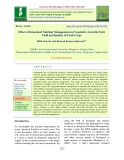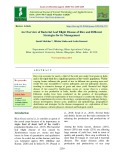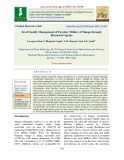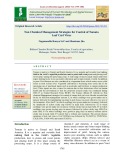
Non chemical management strategies
-
Continuous use of chemical fertilizers without organic sources poses soil health issues whereas organic manures using alone without inorganics could not be able to fulfill the requirement of high nutrient demanding crops due to the bulk and slow-acting nature of these organic fertilizer sources. However, neither organic fertilizers nor inorganic fertilizers alone can maintain productivity. The major yield limiting factors in crops production in Indian soils are NPS deficiencies.
 14p
14p  chauchaungayxua10
chauchaungayxua10
 19-03-2021
19-03-2021
 16
16
 1
1
 Download
Download
-
Rice crop accounts for nearly a third of the total area under food grains in India and is the staple food for a significant portion of the world‟s population. Widely varying factors influence the growth of rice in different rice growing areas and render the crop susceptible to various pathogenic and non-pathogenic diseases, resulting in extensive damage of grain and straw yield. Bacterial leaf blight disease of rice caused by Xanthomonas oryzae pv. oryzae (Xoo) is a serious menace to rice production in India, besides other rice producing countries.
 16p
16p  angicungduoc6
angicungduoc6
 22-07-2020
22-07-2020
 32
32
 1
1
 Download
Download
-
Powdery mildew caused by Oidium mangiferae is a serious disease of mango inflicting considerable quantitative as well as qualitative losses. Though the disease can be successfully managed by agro-chemicals but due to non-eco-friendly nature, high cost and other side effects of chemical control measures, search for eco-friendly, sustainable, low cost strategies becomes inevitable.
 5p
5p  nguathienthan5
nguathienthan5
 04-06-2020
04-06-2020
 18
18
 0
0
 Download
Download
-
Tomato is native to Central and South America. It is a popular and versatile food ranking third in the world’s vegetable production, next to potato and sweet potato and placing itself in first place among the processing crops. A wide range of insects attack tomato and forms major limiting factor in its successful cultivation and in improvement of yield. In addition to pests Viral diseases are also considered as a important factor which causes severe yield losses at most serious level.
 8p
8p  trinhthamhodang1212
trinhthamhodang1212
 06-04-2020
06-04-2020
 12
12
 2
2
 Download
Download
-
Banded leaf and Sheath blight of maize caused by Rhizoctonia solani f.sp. Sasakii [teleomorph: Thanatephorus cucumeris] is of worldwide occurrence and is known to cause substantial yield losses. It is a major production constraint in high yielding varieties under intensive maize production systems. The pathogen has a very wide host range and exhibits considerable pathogenic and molecular variability. Due to non-availability of highly resistant cultivars, the management of banded leaf and sheath blight primarily relies on chemical control.
 9p
9p  cothumenhmong3
cothumenhmong3
 22-02-2020
22-02-2020
 25
25
 1
1
 Download
Download
-
As mentioned above, the first defensive strategy of the host against infection consists of a non-specific phase, where the mucus and its contents (for example defensin and lysozyme) play a major role. Other important soluble chemical factors are acute phase proteins such as C-reactive protein, interferon, lactoferrin, sIgA, and the complement system (159) . • Viruses. Defensin plays an important role in defence against both enveloped and non-enveloped viruses. This protein is present in immune cells, to assists in the killing of phagocytized pathogens.
 76p
76p  nhacnenzingme
nhacnenzingme
 28-03-2013
28-03-2013
 36
36
 2
2
 Download
Download
CHỦ ĐỀ BẠN MUỐN TÌM



















